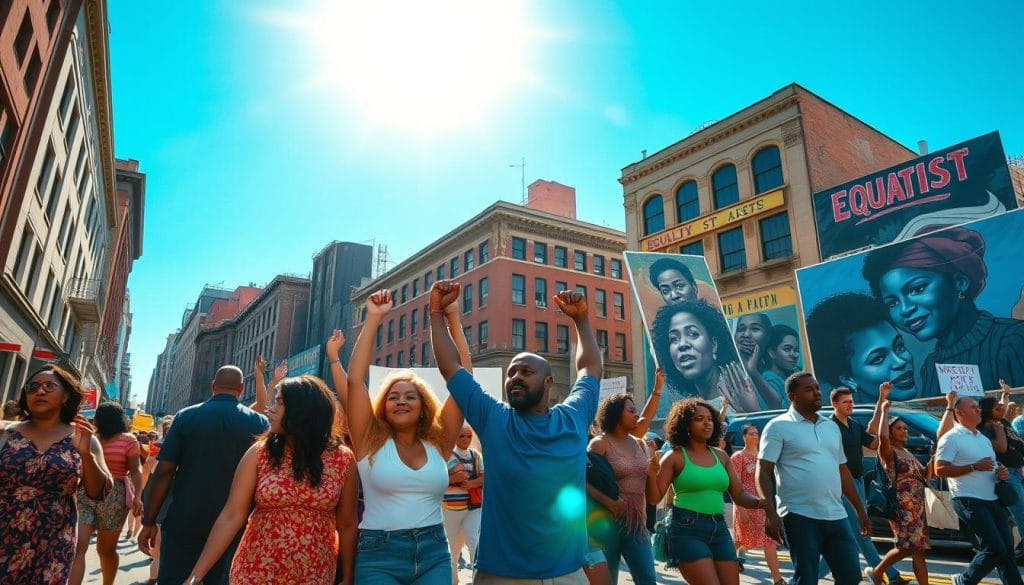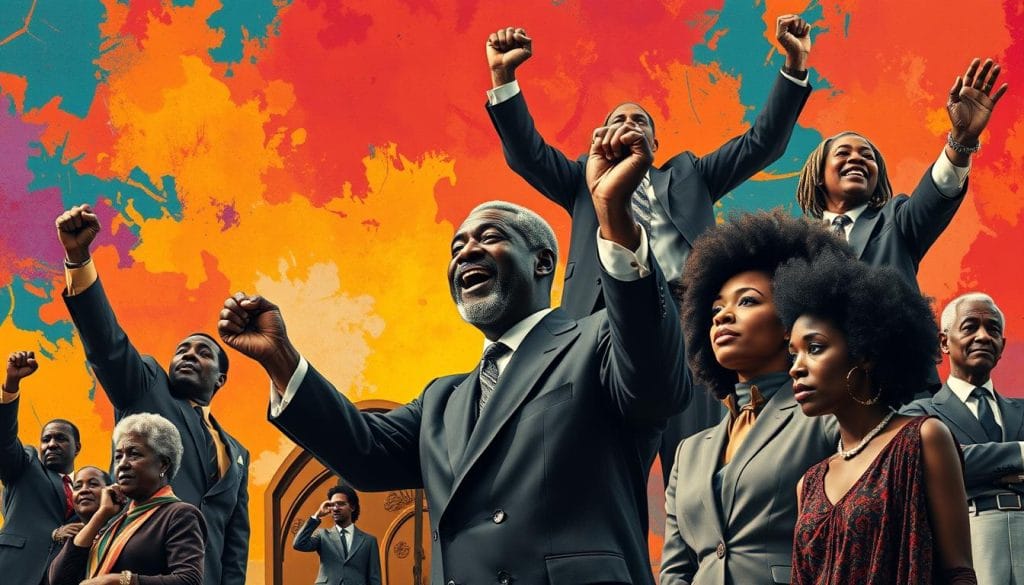Many Americans, 73%, think Black History Month is key to understanding the country’s past. Yet, few know about the big roles Black leaders have played. This month honors those who have greatly influenced our culture, politics, and society. By diving into Black History Month Facts, we can better understand its importance today.
Introduction to Black History Month
Black History Month is a time to look back at African Americans’ rich history and contributions. From the civil rights movement to today, Black leaders have shaped our country. By exploring Black History Month Facts and the lives of these leaders, we can see how vital this month is and its lasting effect on America.
Key Takeaways
- Black History Month is celebrated in February to honor Abraham Lincoln and Frederick Douglass’ birthdays.
- Leaders like Martin Luther King Jr. and Rosa Parks have greatly influenced the civil rights movement.
- Black History Month Facts show the big impact African Americans have had in arts, sciences, and politics.
- Learning about Black Leaders in History promotes diversity and inclusion today.
- Black History Month is a chance to think about how African American culture continues to shape America.
The Origins of Black History Month
Black History Month started in the early 20th century. Civil rights activists and historical black leaders wanted to highlight African American history and culture. Carter G. Woodson, known as the “Father of Black History,” played a key role in starting Negro History Week. This eventually became Black History Month.
Woodson aimed to honor the achievements of prominent black figures like Abraham Lincoln and Frederick Douglass. Their birthdays are in February. This month was picked to celebrate their lives and mark their birthdays.
Some important parts of Black History Month are:
- Recognizing historical black leaders and their roles in the civil rights movement
- Celebrating African American culture, including music, art, and literature
- Learning about the experiences and achievements of civil rights activists and other notable figures
Now, Black History Month is celebrated in the U.S. and other countries. It reminds us of the need for diversity, equity, and inclusion. By remembering the contributions of prominent black figures and historical black leaders, we strive for a fairer world for everyone.
Impact of the Civil Rights Movement
The Civil Rights Movement was a key moment in American history. It changed the country’s social and political scene. Famous black leaders like Martin Luther King Jr. and Malcolm X were at the forefront. They fought for equality and justice.
Their work, along with others, highlighted African Americans’ struggles. It led to important laws being passed.
Some major wins of the Civil Rights Movement include:
- The Civil Rights Act of 1964, which banned discrimination based on race, color, religion, sex, or national origin
- The Voting Rights Act of 1965, which protected African Americans’ right to vote
- The desegregation of public places and schools
These changes have shaped American society. Black history icons keep inspiring today’s social justice fights. Leaders like Rosa Parks and Thurgood Marshall remind us of the ongoing fight against racism and inequality.

Today, the Civil Rights Movement’s effects are still seen. Its key figures and events remain influential. By learning about this history, we appreciate the progress made and the work left to achieve true equality and justice for everyone.
| Event | Year | Impact |
|---|---|---|
| Civil Rights Act | 1964 | Prohibited discrimination based on race, color, religion, sex, or national origin |
| Voting Rights Act | 1965 | Protected the voting rights of African Americans |
Celebrating African American Culture
African American culture has made a big impact on the world. It has enriched music, arts, literature, and poetry. Leaders like Langston Hughes and Zora Neale Hurston have shaped America’s artistic scene. Their work has inspired many to keep creating and innovating.
Black culture’s influence is seen in music and arts. Jazz and blues bring soulful sounds, while African American art adds vibrant colors. Legends like Duke Ellington and Count Basie have set the stage for future artists and musicians.
Historically Black Colleges and Universities (HBCUs) are key in preserving black culture. They offer a place for students to celebrate their heritage. Many influential leaders have come from these institutions.
- Howard University
- Harvard University
- Spelman College
Literature and poetry are also vital parts of African American culture. Maya Angelou and Toni Morrison have inspired and educated through their writing. Their work has been shaped by black leaders and has greatly influenced America’s culture.
Understanding the African Diaspora
The African diaspora is a rich and diverse cultural heritage that has shaped the world. By understanding the global perspectives on Black history, we can gain a deeper appreciation for the cultural exchange and influence that has occurred. Civil rights activists, such as Martin Luther King Jr., have played a significant role in promoting equality and justice for African Americans.
Prominent black figures, including historical black leaders like Nelson Mandela and Malcolm X, have also made significant contributions to the fight for equality and justice. Their legacies continue to inspire and motivate people around the world to work towards a more inclusive and equitable society.
Some key aspects of the African diaspora include:
- Cultural exchange and influence: The African diaspora has had a profound impact on music, art, literature, and other forms of cultural expression.
- Global perspectives on Black history: Understanding the experiences and contributions of African people around the world can help to promote a more nuanced and accurate understanding of Black history.
- The importance of heritage: Preserving and celebrating Black culture is essential for promoting a sense of identity and community among African people.
By recognizing the significance of the African diaspora and the contributions of civil rights activists, prominent black figures, and historical black leaders, we can work towards a more inclusive and equitable society. This requires a commitment to promoting diversity, equity, and inclusion, and to celebrating and preserving Black culture.
| Aspect of the African Diaspora | Description |
|---|---|
| Cultural Exchange and Influence | The African diaspora has had a profound impact on music, art, literature, and other forms of cultural expression. |
| Global Perspectives on Black History | Understanding the experiences and contributions of African people around the world can help to promote a more nuanced and accurate understanding of Black history. |
| The Importance of Heritage | Preserving and celebrating Black culture is essential for promoting a sense of identity and community among African people. |
Notable Figures in Black History
Black history is rich with famous black leaders who have changed the world. They have made big impacts in many areas. By learning about these figures, we can better appreciate Black history’s depth and variety.
Icons like Harriet Tubman, Martin Luther King Jr., and Madam C.J. Walker have left lasting marks. They inspire us today. Others, like George Washington Carver and Langston Hughes, have also made big contributions.
Here are a few examples of notable black leaders and their achievements:
- Harriet Tubman: Led hundreds of enslaved Africans to freedom through the Underground Railroad
- Martin Luther King Jr.: Played a key role in the Civil Rights Movement, advocating for racial equality and social justice
- Madam C.J. Walker: Became one of the wealthiest self-made women of her time, building a business empire in the hair care industry
These individuals, along with many others, are key parts of Black history. They inspire and educate us today. By learning about these leaders, we understand the big roles Black people have played in American culture and society.

By honoring these leaders, we move towards a more inclusive society. Their stories remind us of the power of perseverance, determination, and fighting for justice.
| Name | Achievement |
|---|---|
| Harriet Tubman | Led hundreds of enslaved Africans to freedom |
| Martin Luther King Jr. | Played a key role in the Civil Rights Movement |
| Madam C.J. Walker | Became one of the wealthiest self-made women of her time |
The Importance of Representation
Media and entertainment shape how we see the world. Inspirational black leaders like Martin Luther King Jr. and Malcolm X have fought for equality. Their stories inspire us, showing why diverse media is key.
Black Leaders in History have greatly influenced today’s society. Figures like Rosa Parks and Harriet Tubman led the civil rights movement. Their work shows the power of representation in shaping our world.
- Make casting and hiring more diverse
- Create stories that include everyone
- Give a voice to those who are often unheard
By celebrating Black excellence, we aim for a fairer society. Representation is vital, and we must strive for more diversity in media and entertainment.
We must honor the legacies of inspirational black leaders. This way, we inspire others and work towards a more just world for everyone.
| Inspirational Black Leaders | Contributions |
|---|---|
| Martin Luther King Jr. | Civil Rights Movement |
| Rosa Parks | Civil Rights Movement |
| Harriet Tubman | Underground Railroad |
The Role of Education in Awareness
Education is key in teaching us about Black history and culture. By adding stories of civil rights activists and leaders to school lessons, we learn more about Black history’s importance.
Curriculum changes have made school lessons more diverse. Now, we study figures like Martin Luther King Jr. and Rosa Parks. Yet, we still need more stories of civil rights activists and black figures in our books and classrooms.
To meet this need, new resources for teachers and students are being created. These include:
- Online courses and workshops on Black history and culture
- Books and documentaries featuring prominent black figures and civil rights activists
- Community involvement and initiatives, such as Black History Month events and cultural festivals
These resources help us understand Black history and culture better. They also encourage community involvement. This way, we can build a society that values everyone’s contributions, including those of civil rights activists and black leaders.
Celebrating Black History Month Today
Black History Month is more than just honoring the past. It’s about celebrating the impact of black leaders on today. From civil rights heroes to modern icons, their influence is still strong.
In the United States, many events are happening to mark Black History Month. These events celebrate African American culture and achievements. By joining in, we learn more about black history and its heroes.
Events and Activities Around the Country
- Museums and cultural centers are hosting exhibitions and performances that celebrate African American culture and history.
- Libraries are offering educational programs and workshops that focus on black history and literature.
- Communities are coming together to organize festivals, parades, and other events that promote unity and inclusivity.
The Role of Social Media
Social media is a key tool for Black History Month. It lets us share our views and experiences worldwide. By using hashtags and joining online campaigns, we spread the word about black history and its leaders.
Key Historical Events to Remember
Black history is filled with key moments that have shaped America. Leaders like Martin Luther King Jr. have made a lasting impact. Their work has opened doors for future generations.
Important events include the Brown v. Board of Education ruling and Barack Obama’s election. These moments have shown the power of Black history. They remind us of the ongoing fight for equality and justice.
Landmark Decisions and Their Impact
- The Civil Rights Act of 1964, which prohibited discrimination based on race, color, religion, sex, or national origin
- The Voting Rights Act of 1965, which protected the voting rights of African Americans
- The appointment of Thurgood Marshall as the first African American Supreme Court Justice in 1967
These events, along with the work of Black leaders, have shaped our understanding of equality. Figures like Rosa Parks and Malcolm X have also played key roles in the civil rights movement.
Recognition of Black Achievements
Today, we celebrate the achievements of Black leaders through observances and celebrations. Black History Month is a time to honor African American contributions and accomplishments.
| Event | Date | Significance |
|---|---|---|
| Martin Luther King Jr. Day | Third Monday in January | Honors the life and legacy of Martin Luther King Jr. |
| Black History Month | February | Celebrates the contributions and achievements of African Americans throughout history |
Ways to Get Involved
Black History Month is a time to honor those who have made a difference. We celebrate civil rights activists, prominent black figures, and historical black leaders. To show our respect, we can volunteer in our communities.
Helping out at organizations like the NAACP or the National Urban League is impactful. These groups support the Black community. You can also attend events like lectures, concerts, and festivals to learn more about Black history and culture.
These events offer a chance to meet and learn from influential black leaders. Supporting Black-owned businesses is also key. You can do this by shopping at their stores, eating at their restaurants, and buying from their online shops.
Some ways to get involved include:
- Volunteering for local organizations that support the Black community
- Attending education and cultural events
- Promoting Black-owned businesses
By supporting Black History Month, we help create a fairer society. As historical black leaders have shown, working together is crucial for change. Let’s celebrate and learn from their contributions and strive for a better future for everyone.
| Organization | Mission |
|---|---|
| NAACP | To ensure the political, educational, social, and economic equality of rights of all persons and to eliminate race-based discrimination |
| National Urban League | To enable African Americans to secure economic self-reliance, parity, power and civil rights |
Looking to the Future
Black history has made a huge impact, but the fight for equality and justice is far from over. Famous black leaders like Martin Luther King Jr., Rosa Parks, and Malcolm X have made great strides. Yet, there’s still a lot of work ahead.
It’s crucial to keep learning and remembering the contributions of black history icons. By inspiring the next generation, we can build a fairer society. Everyone should have the chance to succeed.
We can all help shape a better future. By supporting black leaders and businesses, and pushing for inclusive stories, we make a difference. Honoring the past and empowering the future, we can create a more just world.
